So, who's going to win?
October 23, 2012 -- Updated 1907 GMT (0307 HKT)
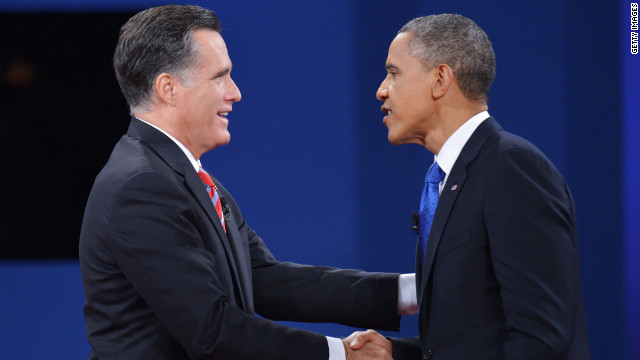
With the candidates done debating, they will engage in a furious battle until Election Day, says David Gergen.
STORY HIGHLIGHTS
- David Gergen: Final debate enabled President Obama to shore up his chances
- He says the race remains too close to call, but Obama has an edge
- President helped his chances in final debate, but Romney passed a test too
- Gergen: We'll find out if Obama campaign's apparent ground strength will come through
Editor's note: David Gergen
is a senior political analyst for CNN and has been an adviser to four
presidents. A graduate of Harvard Law School, he is a professor of
public service and director of the Center for Public Leadership at
Harvard University's Kennedy School of Government. Follow him on Twitter.
(CNN) -- "So, who's going to win?" Traveling the
country, that's the first question that comes my way, often from
complete strangers. The truth is that no one knows -- that's a verdict
only voters can render, and rightly so.
"Well," came a follow-up
question Tuesday morning, "what does your gut tell you? The debates are
over. Where are we two weeks out?"
My gut will feel a lot
more confident after three or four more days when we see how the polls
settle out from Monday night's final debate, but here is my hunch the
morning after.
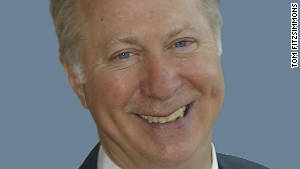
David Gergen
Coming off clear,
back-to-back victories in the final two debates, President Obama has now
shored up his campaign, and -- given what appears to be a superior
ground game -- is again an odds-on favorite to win. But Mitt Romney has
also accomplished a great deal in these debates and is poised for a
possible surprise. Overall, I would put the chances at about 53% for
Obama, 47% for Romney.
Obama has proven once
more that he is better when behind, in the clutch, looking for a
three-point basket. He was too complacent going into the first debate
and almost threw away the election. Judging from e-mails and social
media, many of his supporters felt he had let them down personally,
threatening their ability to get health insurance or other needed
benefits. By reasserting himself in the final debates, he restored their
faith and energy for the homestretch.
Become a fan of CNNOpinion
Stay up to date on the latest opinion, analysis and conversations through social media. Join us at Facebook/CNNOpinion and follow us @CNNOpinion on Twitter. We welcome your ideas and comments.
Over the course of the
final debates, Obama also cut Romney down to more human size. In their
town hall encounter, Obama pummeled him with charges of lying,
misleading voters, and pretending to be a moderate.
Monday night, Obama
charged repeatedly that Romney had been all over the map on foreign
policy. While Romney delivered some effective counterpunches, he no
longer looked the way he did in the first debate -- like a man who went
into a phone booth and emerged as Superman. By the end of the third
night, he looked tired and more like Clark Kent.
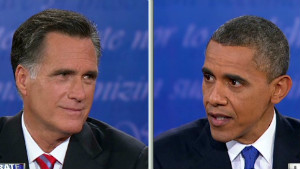 Obama: 'Fewer horses & bayonets'
Obama: 'Fewer horses & bayonets'
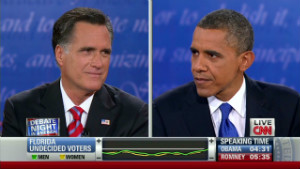 Obama, Romney spar over troops in Iraq
Obama, Romney spar over troops in Iraq
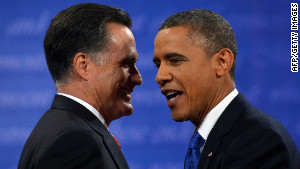 Final debate between Obama, Romney
Final debate between Obama, Romney
Obama in both of the last
debates also did a good job in appealing to key parts of his
constituency that he will need: minorities, women and youth. It is no
accident that he has advanced many policies over the past four years
tailored to their interests -- and now he is trying to bring them home.
Monday night he seemed particularly focused on women, and my sense is
that he helped himself with those still wavering.
Coming into a 14-day
scramble, Obama can now rely upon an additional weapon in his arsenal: a
strong ground game. Because it drove away any potential challengers in
the Democratic primaries, his Chicago team not only got the jump on the
GOP in advertising this past summer, but also constructed what appears
to be a superior field organization.
In the pivotal state of Ohio, for example, the Obama campaign
has three times as many offices, often captained by experienced young
people. By contrast, a major Republican figure in the state, throwing up
his hands, told me that the Romney field team looked like a high school
civics class. The Romney team heartily disagrees, of course; we'll just
have to wait and see.
The Romney team isn't
ready to concede an inch, nor should it. In fact, some conservatives
believe that voters are continuing to drift away from Obama toward
Romney -- and they see Obama's combativeness Monday night as the stance
of a man who knows he is behind. (Obama's continuing condescension may
also have hurt him.) There is no question that Romney gained more from
the debates overall than did Obama: Despite the losses in two and three,
debate No. 1 transformed the campaign into a horse race and it remains
there still.
It is especially notable
that after the second debate -- which focused mostly on domestic issues
-- the same registered voters who told CNN that Obama had won also said
they thought Romney would do a better job on the economy and deficits.
After Monday night's finale, the same voters who told CNN that Obama had
won also concluded that both men were qualified to be commander in
chief. Romney's likability has even passed Obama's in some national
polls.
Many commentators
thought Romney should have attacked more aggressively Monday night; in
fact, his calculated strategy to be more deliberative and above the fray
seemed shrewd -- while he lost on debate points, he was able to avoid a
warmonger label while also passing the commander in chief test.
In short, a candidate
who had been painted by Obama ads as disqualified for the job has now
firmly established his credentials and is ahead on the central issues of
the campaign: jobs, deficits and growth.
These are the makings of
a candidate who can come from behind in key battleground states. Straw
in the wind: Over the course of the debate Monday night, the online prediction market Intrade
showed that the odds in favor of Obama moved up only a point, to 61%;
Tuesday morning, they had dropped to 59%. Before the debates started,
Intrade odds in favor of Obama stood at 74%.
Buckle up -- it could be a wild ride to the finish.

ไม่มีความคิดเห็น:
แสดงความคิดเห็น